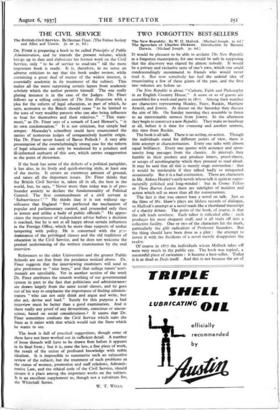THE CIVIL SERVICE
DR. FINER is preparing a book to be called Principles of Public Administration, and he intends the present volume, which brings up to date and elaborates his former work on the Civil Service, only " to be of service to students " till the more important book is ready. It is, therefore, in no sense an adverse criticism to say that the book under review, while containing a great deal of matter of the widest interest, is essentially academic in its treatment of the subject. This makes all the more surprising certain lapses from academic sobriety which the author permits himself. The one really glaring instance is in the case of the Judges. Dr. Finer follows up a telling criticism of The New Despotism with a plea for the reform of legal education, as part of which, he says, accession to the Bench should cease " to be limited to the sons of very wealthy parents who can also bring influence to bear for themselves and their relatives." " This state- ment," as Dr. Finer says of a remark of Lord Hewart's, " is its own condemnation." It is not criticism, but simple bad temper. Macaulay's schoolboy could have enumerated the names of numerous judges of comparatively humble origin. Has Dr. Finer never heard of Baron Pollock ? A very able presentation of the overwhelmingly strong case for the reform of legal education can only be weakened by a petulant and ill-informed outburst of this sort, which carries exaggeration to the point of distortion.
If the book has some of the defects of a political pamphlet, it has also, in its lively and quick-moving style, at least one of the merits. It covers an enormous amount of ground, and raises all the important issues. Dr. Finer thinks that the British Civil Service is, taken all in all, the best in the world, but, he says, " Never more than today was it of pro- founder anxiety to declare the fundamentality of Political Control. The first commandment of a civil servant is Subservience ! ' " He thinks that it is not without sig- nificance that England " first perfected the mechanism of popular and parliamentary control, and proceeded only then to invent and utilise a body of public officials." He appre- ciates the importance of independent advice before a decision is reached, but he is not at all happy about certain influences in the Foreign Office, which he more than suspects of undue tampering with policy. He is concerned with the pre- dominance of the privileged classes and the old traditions of education in the Civil Service, and he does not welcome the gradual undermining of the written examination by the oral interview.
References to the older Universities and the greater Public Schools are not free from the petulance noticed above. Dr. Finer suggests that the interviewing examiners will tend to give preference to " nice boys," and that college tutors' testi- monials are unreliable. Yet in another section of the work Dr. Finer attributes the smooth working of our governmental system in part to the fact that politicians and administrators are drawn largely from the same social classes, and he goes out of his way to emphasise the importance of finding adminis- trators " who can not only think and argue and write, but also act, devise and lead." Surely for this purpose a bad interview must be better than a good examination. And is there really any proof of any favouritism, conscious or uncon- scious, based on social considerations ? It seems that Dr. Finer sometimes confuses the Civil Service which suits the State as it exists with that which would suit the State which he wants to see.
The book is full of practical suggestions, though some of these have not been worked out in sufficient detail. A number of loose threads will have to be drawn firm before it appears in its final form ; but it is, none the less, a fine piece of work, the result of the union of profound knowledge with noble idealism. It is impossible to summarise such an exhaustive review of the subject, but the treatment of such problems as the status of women, promotion and staff relations, Adminis- trative Law, and the ethical code of the Civil Service, should ensure it a place among the important works on the subject. It is an excellent supplement to, though not a substitute for, the Whitehall Series.
W. T. WELLS.






































 Previous page
Previous page